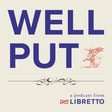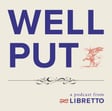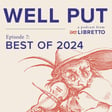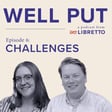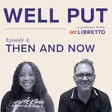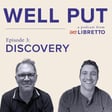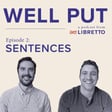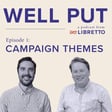Become a Creator today!Start creating today - Share your story with the world!
Start for free
00:00:00
00:00:01

Episode 5: How to Stay Connected While Working Remotely
Libretto operated out of a traditional office in Boston's South End for more than 20 years, but like many companies, we've been fully remote since 2020, and our team is now spread across six states. As the two Librettists who joined after the switch to remote work, Madison and Tiffany discuss connecting with colleagues virtually, as well as the challenges and opportunities afforded by a fully remote model.
Hosted by Madison Hunt and Tiffany Carlson
Produced by Ian Sutherland
Edited by Connor Ferguson
Music by Coma-Media, via Pixabay
© 2024 Libretto. All rights reserved.
Recommended
Transcript
Introduction to Well Put Podcast
00:00:12
Speaker
Welcome to Well Put, a podcast about communications for mission-driven organizations from libretto. My name is Madison Hunt. And my name is Tiffany Carlson. And today, Madison and i are going to talk about remote work at libretto and kind of what our experience was like joining a team that...
00:00:30
Speaker
you know, prior to us had all worked in an office together and knew each other in that in-person capacity. And then what our day-to-day looks like um when we work remote, but interact with our clients virtually.
Madison's Transition from Journalism
00:00:42
Speaker
um So I thought we could start off by talking first about like how we came to libretto and um I think everyone kind of knows libretto went remote like many companies during the pandemic, but how we came to find them. So Madison, you want to talk first about how you came to be here?
00:01:01
Speaker
Yeah, of course. So um for those of you who don't know, I have a background in journalism and I kind of wanted to pivot careers, but still continue to write.
00:01:11
Speaker
So I had came across an ad about libretto. um I want to say it's been over a year ago because i my anniversary was in July. um and then I applied and I got the position.
00:01:25
Speaker
um So it's been... a wild ride in the best way. It's taught me a lot. I feel that the differences that I've seen from, you know, the journalism industry and the skills that I've learned translate a lot to the work that I do Libretto, specifically with like messaging, with talking to people, interviewing, um conducting, you know, focus groups.
00:01:46
Speaker
That has been something that's come fairly easy because of my journalism background, um where are others, it's sort of you know, pivoting into understanding that we are writing for different clients.
00:02:01
Speaker
So people have different perspectives, being empathetic to that. So that is some ways that I've had to navigate different skills and to create new skill sets being at Libretto.
00:02:13
Speaker
um So I guess to you, Tiffany, too, you have a different background
Tiffany's Background in Library Science
00:02:17
Speaker
as well. So how did you come about to do. bruno Yeah, so I actually have a background in library science. um And before that, I just got an English degree. But um for those of you who haven't met me yet, or maybe don't know, I'm producer at Libretto. So I do a lot more of the behind the scenes. I'm not so much writing, you know, our messaging platforms and our case studies. I'm the one writing proposals and the one talking with, you know, billing departments and things like that.
00:02:47
Speaker
And, you Then a lot of the other work I do is actually supporting everyone else at Libretto. And so for me, i brought a lot of that kind of organizational skills and kind of coordinating and keeping everything, you know, not to feed into stereotypes, but neat and tidy and organized like librarians do. Yeah.
00:03:09
Speaker
um So what I used to do also translates well into libretto, just in a way that maybe isn't quite as public and client facing necessarily. um But, you know, it's been really fun to kind of Get to make it up too as I go. Before i started, libretto didn't really have a producer or project manager.
00:03:34
Speaker
so it's been really fun kind of getting to invent the role in a way and kind of see where... where I can fill in some gaps or like help make things more efficient, which is, it's been super fun. And I've been here over two years now. I think you started Madison um like a year after had. Yeah. Yeah. Yeah.
00:03:59
Speaker
So did you work remote before you came to Libretto at all?
Remote Work Challenges and Benefits
00:04:03
Speaker
So I did. So I was an assistant editor for a publication in Los Angeles, and I was actually supposed to move to L.A., but the pandemic hit.
00:04:13
Speaker
So then we all just stayed where we were and had to, you know, navigate and Zoom and meetings online and trying to figure out how to work with people.
00:04:23
Speaker
you know, musicians and different um publications trying to get, you know, access to shows that eventually ended up being shut down. So yeah, it was very challenging, especially in an and industry that you have to go out and meet people.
00:04:41
Speaker
you know you have to spend nights, sometimes in nightclubs, listening to performers and trying to get access to them to then come to your company to perform.
00:04:52
Speaker
And that was also a struggle as well. We owned a um studio. But once the pandemic hit, no one was coming in. We couldn't have performances that we were doing. We were just starting up this new um this new performance thing that we were creating a network for where you know undiscovered artists were coming to our studio performing, trying to get out to the labels that we were in contact with.
00:05:17
Speaker
And unfortunately, all of that had to stop once the pandemic hit, unfortunately. Yeah, it was just like everybody. It was a weird transition. you know, none of us were ready for it.
00:05:29
Speaker
And then all of a sudden, it's like you're used to doing something one way and then you have to figure out how to do it completely opposite. um But in the law yeah in the long run, it wasn't too bad.
00:05:41
Speaker
I will say that it did sometimes make me feel disconnected, um especially because i was on the East Coast and a lot of my coworkers were on the West Coast or they were like spread out across the country. So trying to manage you know, the different ah time zones and trying to set up meetings in general with clients. It was just sometimes it was chaos, but sometimes it worked for us.
00:06:08
Speaker
I was going to ask you the same thing. Like, did you go through any remote work before Liberto? Yeah. So when I first started my role at, so I worked at a university library prior to being at Libretto and that was my first job out of grad school.
00:06:23
Speaker
And when I first started there, like many library jobs, it was a hundred percent in person. Everything we did was, you know, on campus and my role in particular interfaced with the students a lot.
00:06:39
Speaker
I worked in um our reference department so I was you know at a service desk helping students do research for projects and all their classes and then I was also in our um maker space which was this really cool space where we did workshops teaching people you know podcasting and knitting and you know just how to sometimes it was things like how to mend your clothes I mean it's the first year these kids are away from home these adults now they're adults you know once they get to college but yeah skills they didn't necessarily have before they got to campus and so when the pandemic hit
00:07:18
Speaker
It was a really, really strange situation trying to pivot to, you know, how do I take this role that was very largely dependent on being in person with people and translate it to working remotely?
00:07:30
Speaker
And, um, I spent a lot, a lot of time on Zoom. Like Zoom fatigue was real because we would just set up times where students could just drop in and talk and, you know, study together. Because that was another thing that libraries are really useful for in college. I mean, I'm sure anyone who's gone to college kind of knows there's a sort of camaraderie of everyone sitting in the library, right you know, two days before finals start, just trying to cram as much as you can. Like,
00:07:58
Speaker
We tried to replicate that. Yep, yep. So we tried to replicate that online. And then, you know, how do you do a workshop about, you know, a podcast when they can't go to campus and get a microphone and record what they need to for class or, you know.
00:08:15
Speaker
So it was really, really weird. And then... um It didn't stay remote very long. I would say that my role and a lot of roles on campus, as soon as the university had the opportunity to bring people back, that meant staff came back. And so I went back pretty early on.
00:08:34
Speaker
I was actually working hybrid there when I got the job at libretto. um I mean, honestly, for me, part of the perk of libretto was that it was totally remote. I had, during the pandemic, gotten married and moved to like an outer ring suburb. So getting to campus for work, it wasn't a 10 minute commute anymore. It was like an hour and 10 minute commute at that point. And wow I mean, that was on me, of course, for moving to the suburbs, but um because i'm I'm in Minneapolis, so our suburbs are much more spread out, I would say, than other metro areas.
00:09:12
Speaker
But um yeah, it was I was hybrid before I came to libretto. And you know i liked it, but it was kind of hybrid is strange because you go to campus and you never quite know who you're going to see. Yeah.
00:09:26
Speaker
Mm hmm. it's not like hundred percent remote or hundred percent in person where you know you know so-and-s so's going to be in their office down the hall or i always run into this person in the lunchroom or in the break room at lunchtime yeah so it was strange Um, but working remote can, while it can be isolating at times, it can also be a good way to kind of get you thinking about creative ways to keep in touch and, you know, keep the strength of a team.
Integrating into the Libretto Team
00:09:57
Speaker
Um, but I was going to ask you, Tiffany, because you came on to libretto like a year before I did. And, you know, I sometimes felt like, I wouldn't say the word is intimidating. However, i will say that a lot of them already had previous connections.
00:10:14
Speaker
Like for those of you who don't know, Libretto had an office. So most of them were spending every day together. You know, there was one i want to say it was like early on. I think Adrian was going to New York and Ian was like, yeah, just stay with me.
00:10:29
Speaker
And i will say it was inviting because it, you know, it showed that you guys had established connections and you guys really trusted each other, you know, with a small team, you know, it becomes more like a family early on than, you know, expected.
00:10:45
Speaker
So I guess like what was your experience like, you know, trying to come on to A team that had already established themselves that know each other very well, you know, working together in person to the now you're part of this team and now we're all remote.
00:11:01
Speaker
What did that look like for you? So I was very kind of intimidated at first. I will I will say that. Yeah. But what was really helpful, and we did the same when you started, Madison, was we did a company offsite.
00:11:16
Speaker
And so that was, you know, that was a specific attempt to get everybody in the same place at the same time in person for a couple of days. And Madison, I think yours was within the first month, but mine was within my first week.
00:11:33
Speaker
So within the first week, I was in New York in person with everybody. And You know, I don't know if that was better or worse than having a month to kind of get to know people on Zoom.
00:11:46
Speaker
It was fun. It was such a blast. I hadn't been new york to New York in probably 15, 20 years. Like, it was um really exciting. i don't I think I did the math right. No, no, I didn't do the math right.
00:12:01
Speaker
I hadn't been to New York in like 10 years, maybe 15. So it was cool to be back. And then... I think, you know, just seeing everybody in person helped take the nerves away because on Zoom, you're these people in these boxes.
00:12:20
Speaker
and Right. and With a name. You've got the name, you've got like the shoulders up, and that's what you kind of have to go off of. When i saw everybody in person, it was like a, oh yeah, we're all just people.
00:12:33
Speaker
Like it it made it a lot easier to see everybody as kind of a group of peers versus like, I'm the newbie in this Zoom screen full of people who all know each other. And for me, that was really nice. And, you know, everyone at Libretto has experience talking to people, like talking to people is a big component of what we do and how we produce the pieces and, you know, keep these client relationships. And so...
00:13:01
Speaker
I wasn't really worried that I wouldn't have anything to talk about with them because I knew if I ran out of something to talk about, they would know. They would have a question. They would have something to say. I remember during the offsite, um my first week, we went to this really cool bar and everyone was sitting down. And I think I had like filed in kind of last and I was on the end.
00:13:22
Speaker
I was like, oh goodness, I'm off on the end. They're all just going to chat. And almost immediately Ian turned to me and was like asking me questions and, you know, starting a conversation. I was like,
00:13:34
Speaker
I feel like I fit in here. And I feel like, you know, just having conversations spur of the moment like that really, really helped. And part of what i try to do at Libretto then is create opportunities for spur the moment conversations to happen between team members.
00:13:52
Speaker
And sometimes that looks like, let's all have like a coffee break let's do a social hour. Let's do a team happy hour. And that helps keep everybody kind of in tune with each other in like a social sense.
00:14:06
Speaker
Yeah. Beyond like everyone checking in about projects during the week. um But Madison, I'm curious, how how did you feel then, you know, that first month leading up to the offsite and then, you know, did the offsite make a huge difference kind of in how you felt with the team?
00:14:24
Speaker
um i think for sure. i don't know who I said this to. I think it was Neil. And I said, wow, you guys really like each other. Because you never know, no you know, when you are getting like the introductions, you're trying to figure out how to go about like the day to day um duties that you have. You know, you're new to the team. You don't really come face to face with everybody besides like the production meeting, which is in the beginning of the week. So you don't really know what those conversations look like outside of your nine to five.
00:14:58
Speaker
So I'm not sure if you guys were talking on the phone, if you guys were texting, if this was just. a straightforward work relationship. So when you guys told me about, you know, the offsite, I was like, okay, well, this can go either really, really well or really, really bad.
00:15:16
Speaker
And I probably shouldn't have had that mindset just because, know, I don't know, it felt like I was just hanging out with my friends from college. i remember we went to the library in like the town square and I was just mesmerized.
00:15:29
Speaker
um And you know, like little things like that of just us hanging out, talking about, you know, life. I think a lot of The team was trying to get to know me um on more of a personal level than more of just like a professional level, which I appreciated.
00:15:44
Speaker
i think also it helped me understand, you know, just the dynamics of everyone. You know, you guys work, you guys have deadlines that you have to meet. But at the same time, you guys can relax, hang out, have fun, but also...
00:15:59
Speaker
be intentional. I think that's the word intentional about how you guys communicate with each other and how you guys, you you know, want to build outside relationships. I think Neil does a very good job with making sure that, you know, I was an addition to the team, but you guys had to adapt to me and the same vice versa so I really appreciated that seeing it firsthand you know because it's different you know again those squares make you feel like well we're just all boxes and we're talking heads but you know I don't know what you guys are doing outside you know I found out that Ian and I love to go to vinyl shops and we were ran off like randomly after like
00:16:40
Speaker
I guess we were hang all hanging out. And then I found out that Jason was a musician and Tiffany loves to read and Connor loves baseball games. That was also pretty cool, too, going to that baseball game.
00:16:51
Speaker
Granted, I'm not a fan of baseball, but it was actually really fun to just be there. That was kind of like a really good introduction to and I'm glad it happened so quickly, i will say.
00:17:03
Speaker
Because it made me realize that we're, you know, we're people and, you know, we're all trying to navigate being online and remote and trying to work together. So I think that was probably like the best part of my experience early on.
00:17:20
Speaker
right Good, good. I agree. on It helped a lot. I definitely felt more like part of the team when I physically got to go and spend time with the team.
00:17:32
Speaker
Right. Yeah, absolutely. It would have been different had it been like six months in because, again, I only got know you guys on a professional level and we would have, you know, eventually had those times.
00:17:47
Speaker
But, um you know, with the happy hours and the social hours that you plan. But I think being in person, you know, made it feel very it felt more natural to be a part of this team. Mm I agree.
Maintaining Client and Team Connections Remotely
00:18:00
Speaker
I guess like that can pivot into, you know, we have a client facing job and yet yeah we're remote. And I know that can come with like sometimes complications of, you know, meeting people where they are, especially if we're only doing it on a screen.
00:18:16
Speaker
So I guess, you know, my question to you is, what sort of skill set do you need to have to connect with and like build relationships with clients that you meet?
00:18:28
Speaker
Or, you know, what it's like when you eventually, you know, meet them in person, i guess, like, what has that experience been like for you? So I'll say my experience has been somewhat limited. My role isn't so much if there's an in-person meeting that I go along.
00:18:45
Speaker
That said, I have gotten to meet some clients in person. um The big thing, and I know, i think Neil talked about this in the last podcast episode too, was... The big thing is, you know, sometimes like at my former job, we would sit down to a meeting and we would get right to business and we would talk about what we needed to and then we'd wrap.
00:19:07
Speaker
Whereas I feel like when you're working remotely and you're trying to build that relationship with the client, there needs to be a little bit more kind of flexibility kind kind of Yes, we scheduled an hour, but let's take a few minutes and like, what did they do last weekend? Or did they have a nice summer? Did they go on any trips?
00:19:27
Speaker
And kind of make the conversation go beyond the meeting agenda. Like let let pieces of your personal life as you're comfortable sharing them and as the client's comfortable sharing with you, let those pieces come into the conversation and like...
00:19:42
Speaker
kind of like enrich your relationship with them in that level. Because yes, you're still working with them in a like professional capacity, but it's just really nice to know what what's going on in our clients' lives and just kind of know how they're doing, where are they at? Like, you know, it just builds that rapport that makes every conversation after that more comfortable. If you If you can have these conversations about your summer plans, about your holiday plans, they might feel more comfortable saying, hey, you wrote this thing and it's like 95% there. oh Here's my thoughts. like
00:20:18
Speaker
That might help make the working relationship stronger just by virtue of the personal relationship being stronger. Have you had the opportunity to see many clients in person? And what he what do you, I'd pose the question back to you. um I will say I, well, there was a meeting for United Way that was in Baltimore. And we actually were able, Adrienne and I were able to visit their office, meet some of their clients.
00:20:45
Speaker
colleagues and, you know, really talk about um one of their enterprises that we're working on with them. And I think, again, it's the passion that sometimes doesn't get conveyed on a Zoom call, you know, and also with as many passionate people that we work with.
00:21:03
Speaker
And just for the record, I feel like most of our calls don't even last an hour. They're always going to go a little bit over just because a little it you can't you can't pack everything in in an hour.
00:21:14
Speaker
But I will say meeting in person, like you said, it's the passion that you don't always get on a call. I don't think all the time we're meant to be on a computer for 24 hours out of the day, which I feel like most people are. So seeing people in person Granted, it's weird to say that's you know not normal, but at the same time, I think getting back to some of what we used to do, i think it is beneficial because again, you can have those conversations, side conversations with someone. I remember I was talking to someone at United Way as someone was speaking and they told me like, well, you probably should add this to this enterprise or maybe me think of it in this perspective.
00:21:57
Speaker
So I think that also helps too, you know, getting that realism that, you know, sometimes you can't get. And sometimes on these Zoom calls, some people can't speak up the way that they want to, or, you know, they have to send an email after where when you're in person, everybody can talk and then it's not, you're interrupting. It's just a conversation building relationships. It also takes effort, especially that we are remote. So yeah,
00:22:23
Speaker
Going out of your way, asking them how they are, I think goes a long way. um a lot of the people at You Know I Did Way, I used to ah volunteer for them. So i remember telling them about like an offsite that I did um back in high school.
00:22:36
Speaker
And they're like, oh, yeah, like I remember this project. And that's sometimes you can't talk about in the meetings because you have to get right to it where where you're in person. You can have that emotional aspect of it or more of it.
00:22:48
Speaker
um Yeah, I think about it almost like maintaining those relationships while you're working remote just becomes like, a portion of your workload almost. And not in a way that like means it's a chore, but just as it's something that you need to kind of keep in the back of your head and like be conscious of during your workday. like For me, as you know our producer, project manager, I'm not necessarily on all the calls with the clients, which also by extension means I'm not necessarily on the calls with the other librettists.
00:23:21
Speaker
So part of the reason we do these social hours and one of the things I love about having a production meeting every week is sometimes those are like the best and sometimes the only interactions that I get face like face to face through Zoom with coworkers. And obviously, you know, to keep on top of deadlines and scheduling and all that, I'm communicating through Slack or through text message with people all day, but trying to keep aware of, you know,
00:23:49
Speaker
When was the last time I looked at another human's face? Like I'm, I'm aside from my cats, I'm home alone all day. Like my husband goes into his workplace every day.
00:24:01
Speaker
It's, it's nice to, you know, use my voice before 2 PM, you know, but it's probably a little different for you because you, you are on client calls and stuff.
00:24:14
Speaker
It's a little different. I will say with the meetings that we have spread out through the week, sometimes it can be where I'll be talking to someone like every other hour.
00:24:25
Speaker
But then there are days where I'm just like, wow, I haven't talked to anybody and I'm just working. Yeah. Yeah. So I think, you know, implementing like those social hours, because I know like you, sometimes we don't get to talk to each other as much as we want to, or we'll just catch up with text. But those like text messages only last like a 15 minute conversation where, you know, we have to go out of our way to schedule an hour just so we can just hang out and talk, which I think is beneficial for us because a lot of us like that um interaction.
00:25:00
Speaker
And i feel like we need more of it, but we're starting with like, once every month because I know that you scheduled it out for the rest of the year. yeah we're easing into it. But you know, I think, you know, it's starting to feel like more of a routine now, would say.
Personal Interests and Hobbies
00:25:25
Speaker
Well, kind of bring us towards our last section here, ah let's talk about what we're loving right now. So Madison, why don't you ah why don't you start? What are you loving?
00:25:36
Speaker
So my guilty pleasure lately... Has been Emily in Paris on Netflix. And so this is the fourth season. It's gotten really juicy.
00:25:46
Speaker
And granted, I don't watch a lot of shows. I'm a movie lover. So okay for something to hook me like this, it has to take a lot. um So my parents and I actually, they just started it And so on the fourth season, we started watching it together.
00:26:03
Speaker
And it's become really, really good. i don't want to spoil it for anyone, but they're actually going to a different country next season because they just got approved for season five. So, ok yeah, it's it's a lot of...
00:26:16
Speaker
drew it's not really drama it's like light drama she is someone who works at a marketing agency she works in the fashion um music industry she works with a ton of different artists and all of her colleagues have very flamboyant loud personalities but in like the best way and they're all French um oh so I also i love the fact that um And most episodes, they're not translating for her because she's a Emily is an American. She's from Chicago.
00:26:45
Speaker
So you'll have her co-workers just speaking in French while she's there because she hasn't learned it yet, which I appreciate. Yeah. um So, it's you know, just building off of each other's cultures. I see the difference in the way that French live their lives.
00:26:59
Speaker
um And you just see things that you've never like where it's so typical to see like the eiffel tower and you know the louvre but to see you know the suburban parts of uh france which is also very beautiful and it kind of is just like a romance comedy sort of show so i recommend it for everybody it's on netflix okay and it's a cool it's a very easy easy watch all right cool yeah Easy watches are nice.
00:27:29
Speaker
Especially on Netflix, because sometimes they're just too dramatic. Right. um But I guess I'm going to toss the question back at you, Tiffany. What are you loving these days? My answer is kind of funny because a couple of weeks ago, I might have said baseball.
00:27:44
Speaker
But in the past couple of weeks, my home team, the Minnesota Twins, have not been doing too great. a What we thought would lead to a postseason is no more.
00:27:55
Speaker
um I feel like i i have dragged Blabretto kicking and screaming to at least tolerate discussion of hockey. And so what I'm loving...
00:28:06
Speaker
Is that hockey has started. Yes, the Minnesotan likes hockey. It's a whole stereotype, but the preseason started this past weekend. And so I'm very excited to get into hockey season, both for men and women's professional hockey teams. I follow them both here.
00:28:23
Speaker
um And the first game I'm going to is in a couple of weeks now. And I'm just really excited. And hopefully the Minnesota Wild pull out a decent season.
00:28:34
Speaker
um And yeah, so I've just been loving the transition, I guess, from baseball to hockey every time. you know, I switch from one to the other. It's nice how their seasons just barely overlap.
00:28:46
Speaker
I can go from kind of feeling kind of discouraged to being all optimistic again and, you know, repeat in the spring. Also very Minnesotan thing to say is I'm ready for it to be cold again. It's like 85 degrees outside as we're recording this and it's it's the end of September and i I want it to feel like fall. I love fall and winter.
00:29:08
Speaker
I love fall, so I'm with you on that. I don't know about the cold, but I love me ah like ah the fall time where this leaves change, the pumpkins are out. Oh, yeah. Apple cider.
00:29:19
Speaker
Yep. I'm going pumpkin picking and apple picking next weekend with an old college friend. We're going to meet. She lives in Madison, Wisconsin. And so we're going meet halfway at a place that neither of us have been to. And so I guess, yes, I'm also loving fall things right now.
00:29:36
Speaker
I'm not a pumpkin spice girly. I'm an apple cider girly, but I'm definitely looking forward. Yeah. Yeah. So that's what I'm loving and looking forward to. And yeah, it's been nice to sit and talk and like on a personal level.
00:29:54
Speaker
it's been nice to kind of reflect. So thank you for joining me. This has been Well Put, a libretto podcast. I'm Tiffany Carlson. And I'm Madison Hunt. If you want to learn more about libretto and what we do, check out libretto-inc.com.
00:30:10
Speaker
Again, you can check out our website at libretto-inc.com. Well put.
